Playing with puppets is one of the most educational activities you can expose your kids to. Watching a child play with a puppet may seem like fun and entertainment, but it is so much more.
When you realize the importance of puppetry in early childhood education, you may want to keep a basket of puppets for kids available at home or in your classroom.
There are great developmental benefits that are embraced when you encourage playing with puppets.
What Kinds of Puppets Can Young Children Play with?
The wonderful thing about puppets is they don’t have to be expensive store-bought models. The humble sock, the odd one that always hangs around, can be made into a very engaging puppet.
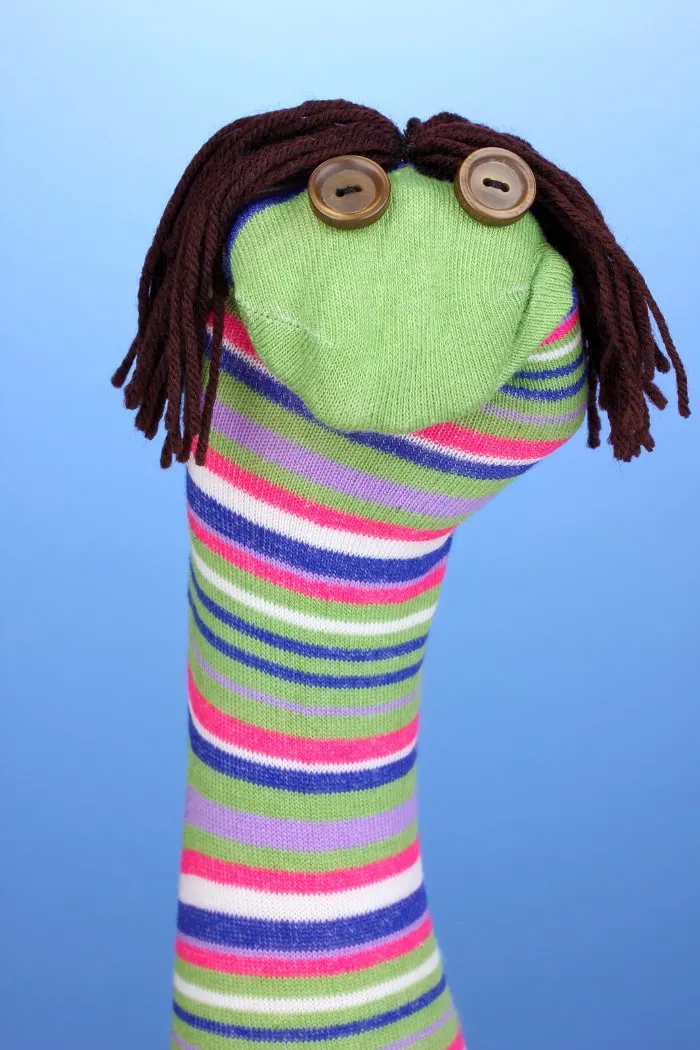
Young children love to play a game of ‘peek a boo’ and a puppet is a perfect partner for this activity. Make a puppet from a paper bag or try to make a string puppet using cardboard boxes or toilet rolls.
The purpose of the puppet is to create interaction, fun dialogue and even an element of surprise in your play and learn activities. Playing with puppets will benefit your children’s development in the early years.
Take a look at this list of nine benefits of puppets in the classroom or home.
9 Benefits of Puppet Play for Preschoolers and Toddlers
How do puppets help children’s development? They have the potential to improve language skills, creativity, social awareness and more.
Here are nine examples of the benefits of using puppets in preschool and at home.
1. Language Development
Children love to have ‘conversations’ with a puppet. Each verbal interaction with their puppet will encourage language development.
Children who are generally shy really benefit from the opportunity to let the puppet be their voice.
It is also possible to have a conversation between two puppets. Wearing a puppet on each hand enables the puppeteer to have a dialogue going on between two puppet characters.
2. Social Development
The shy child, or the young child still learning social skills, has an opportunity to be more sociable through the medium of a puppet. The puppet becomes the spokesperson for the group.
A puppet can be the voice used to correct table manners or other social skills. The puppet becomes the instructor and children often enjoy listening to the puppet teaching them to be sociable.
It is not mom or dad’s voice setting the rules again, but a funny puppet character.
3. Emotional Development
Puppets can teach children about their emotions.
Children can interact with the puppets as they share their ability to be happy, sad, angry, funny or jealous.

Children can express these emotions too without upsetting anyone. Their puppet character is the one to feel these emotions. Playing with the emotions of the puppets helps to develop the characteristics of sympathy and empathy too.
Children also experience this kind of expression when engaging in symbolic play.
4. Listening Skills
Puppets are great tutors.
The puppet on your hand can encourage your kids to listen to it as it gives instructions or tells a story.
Puppets can help children to learn rhymes and songs as they imitate the puppet too.
5. Motor Skills
There are a number of motor skills that children can improve through playing with puppets.
The fine movement required to wear a puppet helps with dexterity and using fingers to manipulate the puppet improves fine motor coordination.
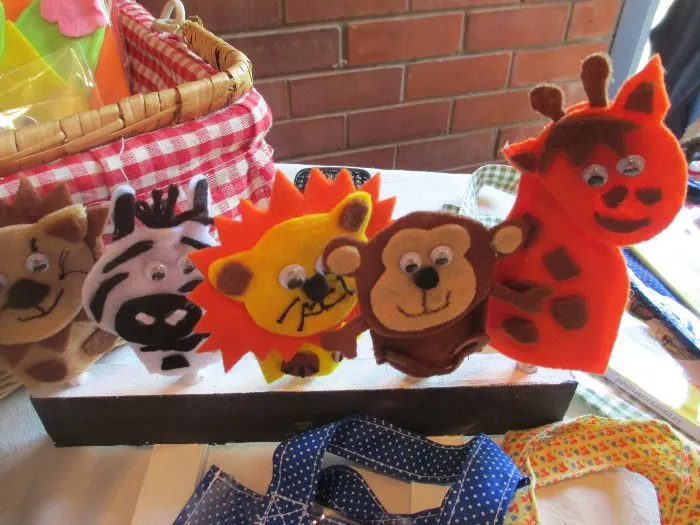
Marionettes or string puppets help with eye-hand coordination as the puppet is made to walk and move in different directions.
All these skills improve balance and directionality as the child has great fun playing with the puppet.
6. Building Self Confidence
Putting on a puppet show for kids often happens quite spontaneously when children have access to puppets.
It is really encouraging to see how children develop their self-confidence through the act of handling a puppet. As their confidence grows they will be happy to entertain family or friends.
The puppet is centre stage and the child becomes more confident to speak in front of other people with the help of a puppet friend.
7. Creativity
Puppets encourage creativity on several different levels.
Making your own puppets from recycled socks or paper bags is just the starting point. There are many interesting ways to create your own puppet characters.
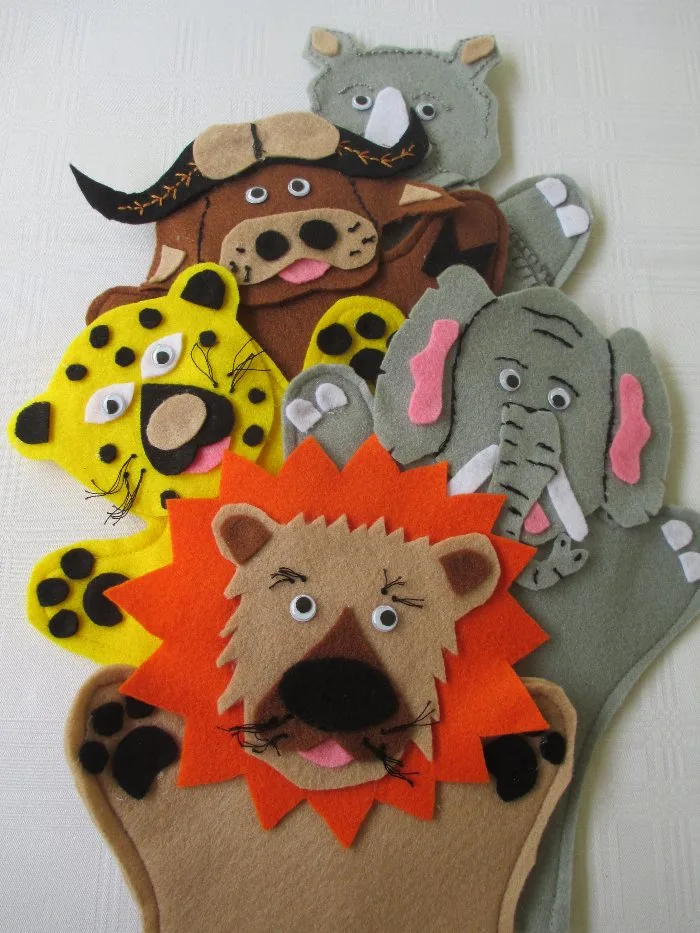
Creativity continues by putting together a puppet show. The show will need a simple puppet theatre and decorating an old cardboard box for this purpose adds to the creativity factor.
8. Story Telling and Sequencing
Storytelling comes alive with puppets. Retelling favourite fairy tales can make it easy to think of puppet show ideas when starting out.
Learning how to repeat the rhyming part of the story, like in The Gingerbread Man, helps with memory skills.
Puppets lend themselves to being the characters in your stories and allow children to join in with the action.

9. Travel Companions
Packing a puppet in your travel bag or even popping one in your handbag is a wonderful way to provide entertainment when you need it. A hand or glove puppet and a storybook are all you need for some holiday travel fun.
Next time you are caught in the doctor’s waiting room, a puppet and a book may be all you need to distract your child. The beauty of puppets is they are lightweight, unbreakable little entertainers and they travel well.
The creator of the Muppets, Jim Henderson, had this to say about the value of puppets:
“One of the nicest things about puppets is that it’s your own hand in there. You can make it do anything you want to.”
As a parent, you can add all the puppet play benefits to that statement. Instead of just watching a puppet show you can bring the real thing into your home.
These are just a few reasons to highlight the advantages of puppet making and playing, as well as the importance of puppet shows for preschoolers.
How to Make Simple Puppets
It is not difficult to make your own puppets. Children are generally happy with something you have made together and created for the purpose of telling stories or putting on a puppet show.
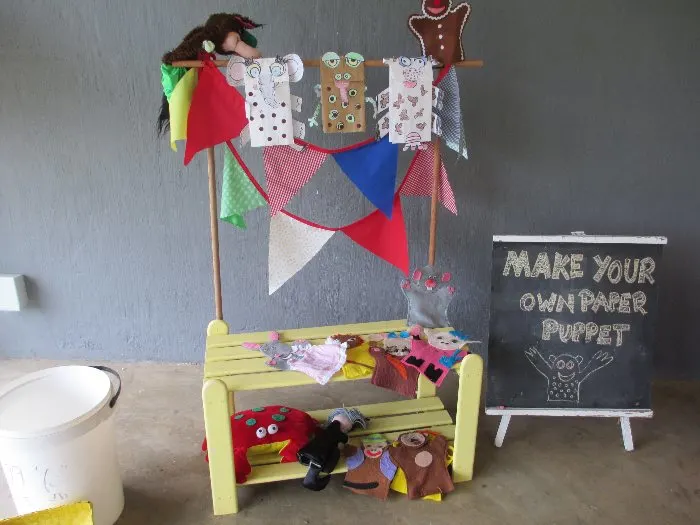
Sock puppets are the easiest little critters to make. A couple of googly eyes and a bit of red felt for a tongue and hey presto you have a snake.
Make sure the sock is a nice long one to go right up your arm. Your silly snake or worm can play ‘peek a boo’ or sing silly songs.
Keep a stack of paper bags for rainy days and make paper bag puppets with stickers and marker pens to decorate.
You will be amazed at how easy it is to make a funny face on a paper bag and then use the flap or fold at the front of the packet for a mouthpiece.
Let your paper bag puppet talk and sing funny songs. Paper bag puppets will encourage all the benefits of puppets including creativity and craft.
Here are step-by-step instructions to make four simple types of puppets.
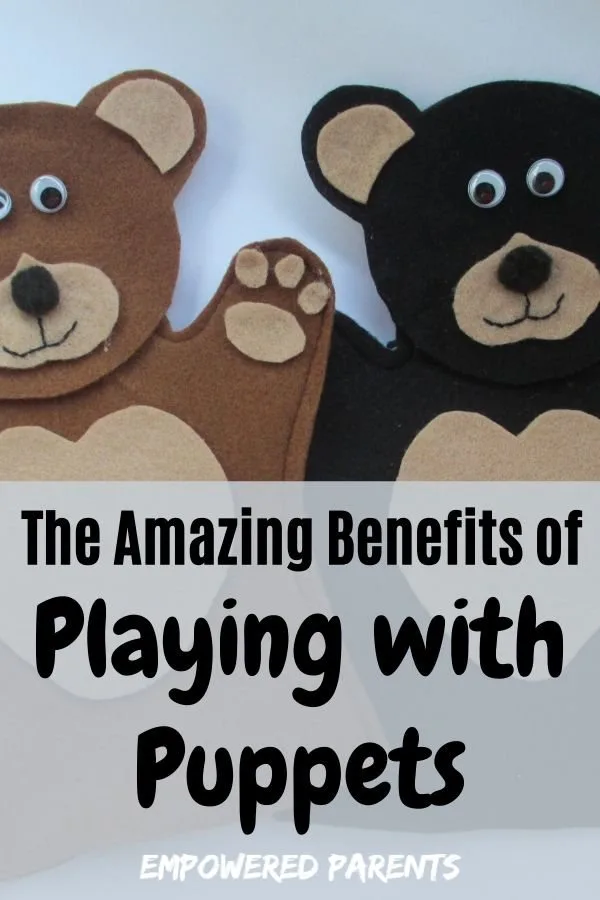
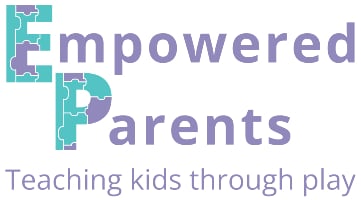
Sunday 14th of April 2024
My kid loves it. Thank you. :)
niveithika
Sunday 13th of November 2022
When did you make this?
Tanja Mcilroy
Monday 14th of November 2022
Hi there, It was published on 6 Jan 2020.
Schyler
Sunday 23rd of October 2022
I have been using puppets and voices for my sons toys. My concern is he likes them too much. He only wants me to be “otter” or “tow mater”. It’s the first thing he asks for when he wakes up and seems obsessed. Not sure what to do about this.
Tanja Mcilroy
Monday 24th of October 2022
Hi Schyler, thanks for your comment. I think there's no harm in doing the voices and being playful, but only when you're in the mood. You certainly don't need to be forced into being these characters all day. I would matter-of-factly respond that you want to be yourself today and don't change your mind. I'm not a discipline expert but Janet Lansbury is and I'm almost certain she would say that you can simply put in a firm boundary, while acknowledging the feelings by saying something like "I know you love when I pretend to be "Otter" but I'm not going to do it today/this week." By reading her website at https://www.janetlansbury.com/ you will pick up lots of tips on dealing with these sorts of things.
gudiyagupta479@gmail.com
Thursday 26th of November 2020
Good activity
Tanja Mcilroy
Friday 27th of November 2020
Glad you like it!
Roxanne Kilbourne
Tuesday 11th of August 2020
I am looking forward to sharing with parents! Thank you. :)
Tanja Mcilroy
Wednesday 12th of August 2020
You are welcome Roxanne!